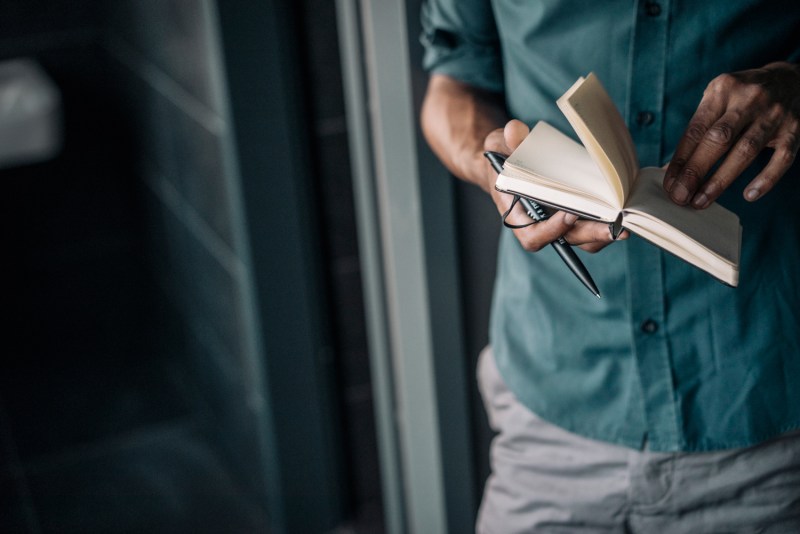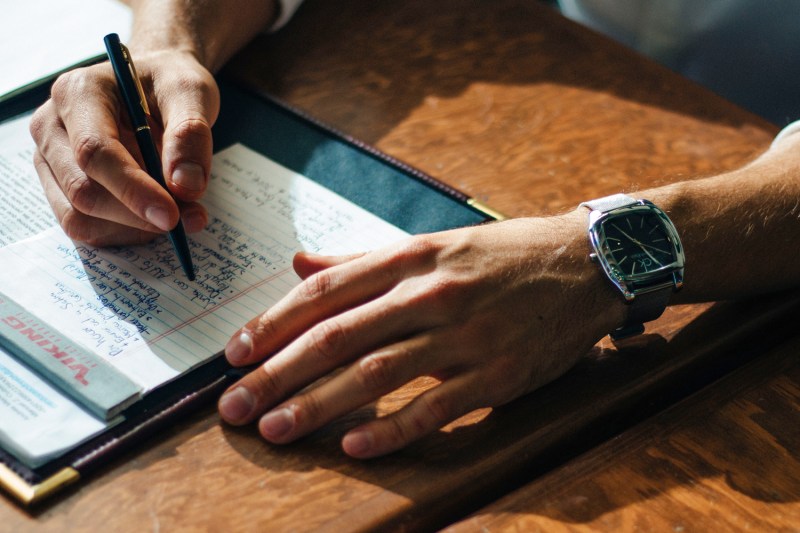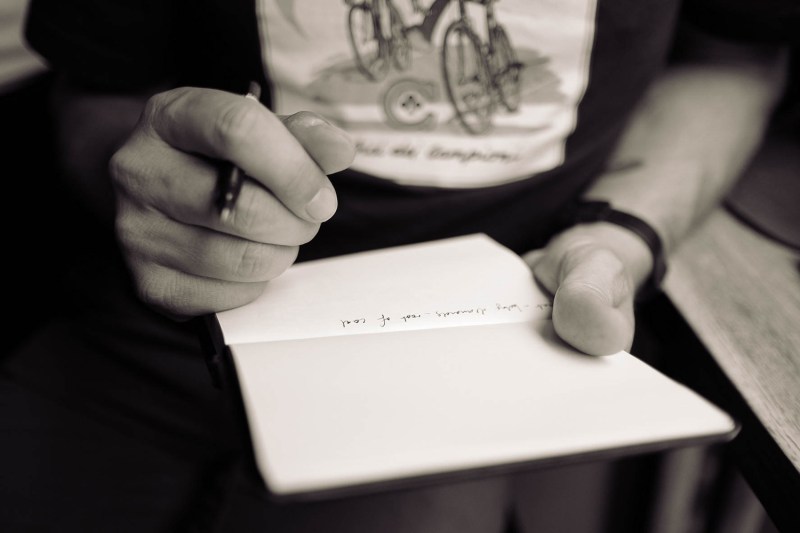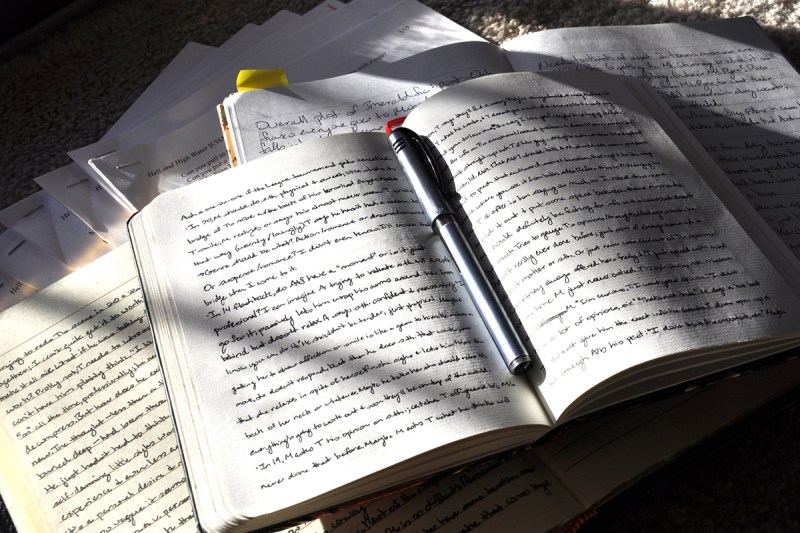
Well-being is more than just hitting the gym on a consistent basis and downing the occasional protein smoothie post-workout. What you do outside the gym is equally crucial, if not more so. Now more than ever, it’s essential to practice constant self-care to keep our mental, physical, and spiritual health in harmony — an overall holistic approach.
Journaling is both a great habit and a great self-care activity that can be incorporated into your daily routine (or weekly if you are just getting started, it is completely up to you). But you may be asking yourself, “How should I start journaling?” We’re here to cover some of the basics of how to start journaling and provide you with some useful information and tips so you know how to journal daily — or weekly!

What is journaling?
Did you know there is actually a difference between a diary and a journal? For many, it’s a distinction without a difference, but by definition, a diary is a means of recording events as they happen. On the other hand, a journal is a little more personal and truly is limitless in how it can take shape. A journal is simply a book, notepad, or digital platform in which ideas and goals take shape.
Journaling allows you to organize your thoughts, document your goals, make life decisions, and even heal from past traumas. It’s truly a powerful tool that, when incorporated into your regular routine, can provide numerous benefits.

Why should men journal?
Although many men may scoff at the thought of keeping a journal, many of the greatest visionaries in history had journals: Leonardo Da Vinci, Albert Einstein, Nikola Tesla, and Ernest Hemingway, to name a few. Not to mention the numerous benefits of journaling are well-documented.
One of the best benefits of keeping a journal is that it helps to hold you accountable. Writing out your goals and aspirations is a means of tracking progress (or lack thereof). Imagine looking back on older journal entries about previous goals and being able to celebrate how far you’ve come and what goals you have checked off your list. In addition to accountability, here are some other benefits of journaling regularly:
- Manages stress
- Gives you immortality
- Allows introspection and reflection
- Boosts your mood
- Improves memory
- Reduces symptoms of anxiety and depression

More benefits of journaling
Above, we mentioned some benefits of journaling, such as relieving stress and improving memory. Here are some additional benefits that perhaps you haven’t considered.
Improved sleep quality
Writing down your worries and concerns before bed can help clear your mind and prepare for sleep. This can be especially helpful for people who suffer from insomnia or other sleep disorders.
Boosted immune system
Several studies have shown that journaling can improve immune function. This is likely due to the stress-reducing effects of journaling, as well as its ability to promote positive emotions and self-awareness.
Enhanced creativity
Journaling can be a great way to spark creativity. By writing down your ideas and exploring them freely, you can come up with new and innovative solutions to problems.
Better communication skills
Journaling can help you improve your communication skills by allowing you to practice expressing yourself clearly and concisely.

Choose your medium
If you’re trying to get into the habit of journaling, the first thing you want to decide is where you want to keep your thoughts. In this era of the “Digital Age,” journaling looks quite different from what it once was. And that’s the true beauty of journaling: You can customize it to suit your daily life and needs. Some men find it easier to jot down their thoughts with pen and paper, but your options are limitless (and can even include a combination of mediums). If you prefer a digital medium. Evernote, Notepad, WordPress, and Word Processors are great places to start if a paper journal isn’t your thing.
On the flip side, suppose you enjoy good old-fashioned pen-to-paper journaling. In addition to having a plethora of digital mediums for organizing your thoughts, here are a few types of journaling styles you may want to consider:
- Bullet journaling: Invented by the digital product designer Ryder Carroll, this option is perfect for the goal-oriented person who wants to organize a head full of ideas into concrete accomplishments.
- Morning pages: This mode is less rigid than bullet journaling. It simply involves sitting down with a pen and notebook, starting to write, and not stopping until you’ve filled up three pages. The idea here is to wean yourself away from the self-editing impulse that so often gets in the way of authentic self-expression.
- One-sentence journaling: The one-sentence journal is perfect for the person who doesn’t have time to journal (or just has a hard time maintaining a routine or has issues with ADHD). This format is as simple as it gets — all it takes is jotting down one sentence that sums up whatever stands out as significant about your day.
- Scrapbook journaling: If you’re the type who can’t throw away ticket stubs, matchbooks, or concert flyers, a scrapbook-style journal is probably your ideal form.

Keep it simple and start slow
Let’s face it, we know that new habits can be challenging to form because we have such short attention spans (especially in the era of social media). That’s why it’s important to start slow and schedule time out of your day to journal. If you don’t think you can commit to a journaling schedule, start slow. Five minutes here, seven minutes there — the idea is to slowly incorporate it into your daily routine. It doesn’t matter where or how you start. You can write a single page or even a single sentence. What’s important is the formation of this habit.
If you’re having trouble adhering to a journaling schedule, try doing it at different times of the day. You could even try writing in a new environment. Switching up your surroundings can spark creativity, engage your senses, and give you different inspirations. Whether you decide to write in front of a café, at the dog park, or even on your balcony, try writing in a new environment to switch up the mundane.

Create a new habit
If you have a hard time creating new healthy habits, try the 21/90 method. It’s pretty simple: Commit to a goal for 21 days straight, and after those three weeks, you have, hopefully, successfully created a new habit. Congratulations! But don’t stop there. Continue with this new habit for another 90 days, and you now have a permanent fixture in your lifestyle. As aforementioned, the benefits to journaling are numerous, so if you’re looking for a new productive habit to form, you may want to make it journaling!

Not sure what to write about?
If you’re just getting into the swing of journaling, or if you’re experiencing writer’s block, there are a couple of things you can do to help get those creative juices flowing.
Write about gratitude. Taking the time to express gratitude has a host of benefits, including improved sleep quality, and reduced stress hormones, and it even is said to make you live longer. If you struggle to find a topic to write about, just simply use it as a time to write about what you’re thankful for. It is even said that showing gratitude daily is the one thing all successful people share in common — just food for thought.
In addition to expressing gratitude, try using a daily prompt. Many journals already come with prompts written in them, but you could also search for them online. With this, you will never experience writer’s block again.
Set a timer
Creating new routines can be challenging, and that’s why we’d recommend setting a timer. Adding a timer into the mix not only improves discipline and mindfulness but, most importantly, it sets a firm intention. During the time allotted, your intention is clear: to write your thoughts for “X” amount of time. With intention comes concentration and focus. Focusing on a very specific task for a specific amount of time helps to make things more manageable.
Just write
This one is pretty self-explanatory: Just write and let your stream of consciousness flow. With countless thoughts running through your mind, often simultaneously, stream-of-conscious writing is a great way to clear your mind. But why should you incorporate a stream-of-consciousness writing style? Well, think about this: Are you ever bogged down by the worries, questions, and to-do’s floating around in your mind all day? Some may feel it in the morning, some may feel these thoughts right before bed, and they can become overwhelming.
Stream-of-consciousness writing is simply writing whatever comes to your mind. There are no specific rules for this; just take pen to paper and write down any and all thoughts in your mind. The idea is not to force the process. Oftentimes, this style of journaling brings to the surface a lot of thoughts buried within your subconscious. This is not only healing but also helps you to gain insights on things you may not have even known you needed.



